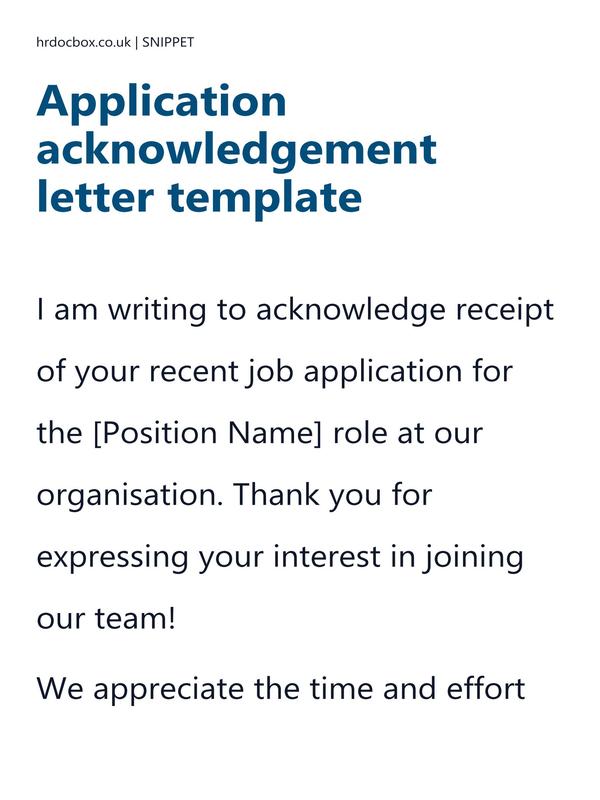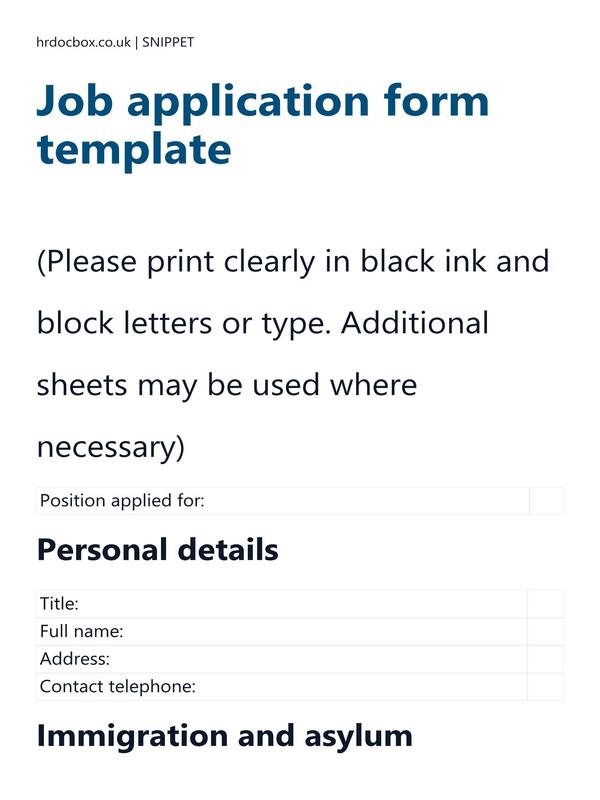Job application templates toolkit
If you are recruiting into your organisation, these job application templates will help you to acknowledge and provide feedback to candidates effectively.
Our Job Application Templates Toolkit simplifies the application process, ensuring consistency and efficiency in attracting top talent.
- Includes 12 months' access to 7 Job Application templates, with all updates to the Job application templates toolkit provided free of charge and notified to you.
- UK-specific accuracy.
- Instantly download templates as Word / PDF / plain text, or send by email.
- These Job application templates toolkit will SAVE you up to 6 hours drafting & research, save you money, and reduce your risk.
Job application
Job applications are formal documents or online forms that individuals submit to apply for employment opportunities within an organisation. These applications typically serve as the initial point of contact between the job seeker and the employer, providing essential information about the candidate's qualifications, skills, experience, and interest in the position.
A typical job application includes several components:
-
Personal Information: This section requests basic details about the applicant, such as their full name, contact information (address, phone number, email), and sometimes demographic information like date of birth or gender.
-
Education: Applicants are asked to provide information about their educational background, including degrees earned, institutions attended, and any relevant certifications or qualifications.
-
Work Experience: This section allows applicants to outline their professional history, including previous job titles, employers, dates of employment, and key responsibilities or achievements.
-
Skills and Qualifications: Applicants may be asked to list specific skills, competencies, or qualifications relevant to the position they are applying for. This could include technical skills, language proficiency, or certifications.
-
References: Some job applications request contact information for professional references who can provide insight into the applicant's character, work ethic, and abilities.
-
Cover Letter or Personal Statement: In addition to completing the application form, applicants may be required to submit a cover letter or personal statement expressing their interest in the position, highlighting relevant experiences, and explaining why they are a suitable candidate.
Job applications serve as a screening tool for employers to evaluate candidates and determine which individuals to invite for further assessment, such as interviews or skills tests. It's important for applicants to carefully review and accurately complete job applications to present themselves in the best possible light and increase their chances of being considered for employment opportunities.
It is important to acknowledge an application, to give a good impression to the candidate, and comfort that they are being managed in a professional manner.
Job application templates are essential for managing a low-risk, compliant Job application process.
Compliance
Compliance
-
The Equality Act 2010: This legislation prohibits discrimination on the basis of protected characteristics such as age, disability, gender reassignment, marriage and civil partnership, pregnancy and maternity, race, religion or belief, sex, and sexual orientation. Job application templates must be designed to avoid any discriminatory language or questions and to ensure that all candidates are treated fairly and without bias.
-
The Data Protection Act 2018 and the GDPR: These regulations set out requirements for the collection, use, and storage of personal data. Job application templates must be designed to collect only the personal data that is necessary for the recruitment process and to ensure that all personal data is handled securely and in compliance with these regulations.
-
The Rehabilitation of Offenders Act 1974: This legislation sets out the rules for when criminal convictions must be declared on job applications. Job application templates must be designed to comply with these rules and to ensure that all applicants are treated fairly and without discrimination.
-
The Immigration, Asylum and Nationality Act 2006: This legislation requires employers to carry out right to work checks on all job applicants before they are employed. Job application templates must include questions to collect the necessary information to conduct these checks and to ensure that the employer is compliant with this legislation.
-
The National Minimum Wage Act 1998: This legislation sets out the minimum hourly rate that employers must pay their employees. Job application templates must be designed to ensure that the employer is compliant with this legislation and that all applicants are informed of the hourly rate that will be paid.
Job Application workflow
Job Application workflow
Here we show you which resources to use to effectively coordinate job applications and interviews, taking into account the different decisions and directions that are likely / possible.
Following this flowchart will ensure that you factor in all eventualities, follow legal / code of conduct or best practice processes, communicate effectively, and reduce the risk of things going wrong.
Frequently Asked Questions about Job Application templates
Frequently Asked Questions about Job Application templates
-
Can small businesses use these Job application templates?
Yes. The Job application templates in this toolkit are designed to be flexible and suitable for organisations of all sizes, including small businesses and charities. They follow UK employment law best practice, so even if you don't have an in-house HR team, you can confidently manage Job application processes and issues.
-
Are these Job application templates up to date for UK law in 2026?
Absolutely. All templates are drafted with the latest ACAS guidance and UK employment legislation in mind. We review and update them regularly, so you can be confident they remain compliant.
-
What types of Job application letters and documents are included?
Every toolkit includes a complete set of editable templates, supporting documents, and manager guidance designed to save time and ensure compliance.
-
How will this help me as an HR manager or business owner?
Purchasing the toolkit saves you hours of drafting time and reduces the risk of legal mistakes. Instead of starting from scratch, you'll have clear, professional templates that you can adapt to your business.
-
Do I get instant access to the templates?
Yes. Once purchased, you'll be able to download the Job application toolkit instantly. The templates are provided in editable Word or Excel format so you can customise them easily, and PDF format for easy sharing.
-
Can I preview a sample Job application template before buying?
We provide free examples of our templates here. This gives you a sense of the quality and layout before you commit to purchasing the full toolkit.
-
What if I need a full HR toolkit, not just Job application templates?
If you're looking for broader support, we also offer library bundles that include Job application templates along with absence, grievance, and other HR policies. These may be more cost-effective if you need a complete HR library.
-
Why should I use these templates, and not AI to generate them?
The risk of using free AI-generated templates 'without review' includes your legal exposure, missing context, and no awareness of the wider process. Purchasing from us mitigates that risk.


-letter-template-preview.jpg)

-letter-template-preview.jpg)
-letter-template-preview.jpg)
-letter-template-preview.jpg)

-letter-template-preview.jpg)